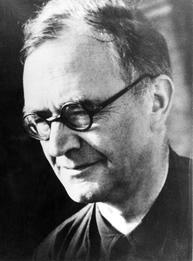As I prepar e to teach an undergraduate seminar on Calvin and Barth, I’ve been reflecting a bit on how I want my students to engage the latter, since (1) they have likely never read him firsthand and, more importantly, (2) he is not especially lauded in contexts in which my students have been reared or currently find themselves. The second point raises for me the general question: how should I (and my more-or-less conservative students) engage with less conservative writers, particularly upon a first (or second or even third) encounter? Along similar lines: how should we read theologians with whom we have fundamental disagreements? Granting that conservatism is in the eye of the beholder, and that some differences are irreconcilable, I venture a few suggestions.
e to teach an undergraduate seminar on Calvin and Barth, I’ve been reflecting a bit on how I want my students to engage the latter, since (1) they have likely never read him firsthand and, more importantly, (2) he is not especially lauded in contexts in which my students have been reared or currently find themselves. The second point raises for me the general question: how should I (and my more-or-less conservative students) engage with less conservative writers, particularly upon a first (or second or even third) encounter? Along similar lines: how should we read theologians with whom we have fundamental disagreements? Granting that conservatism is in the eye of the beholder, and that some differences are irreconcilable, I venture a few suggestions.
Read charitably. This can take a number of forms, but let’s here describe it as the disposition to presume innocence in others. We read charitably when we don’t assume sinister motives underlying a theologian’s works. The way of love is not to be fearful or suspicious that a writer is somehow trying to undermine all the things we hold dear. Rather, we suspend judgment till a far later stage in our engagement. Related, charity assumes that the theologian—especially a good or “great” one—has done his or her basic exegetical homework, even if no explicit mention of certain passages is made. A good theologian is rarely ever as dull or silly or blind as one might conclude on a first pass.
Read humbly. It’s healthy to acknowledge that our own theological views, though sound, are partial, parochial, and provisional. In that light, we must allow ourselves to be corrected, even if by Balaam’s donkey. “Less conservative” theologians reject “conservative” beliefs for a number of reasons. We need to read closely and take seriously some of these reasons, as they might be the fire in which our beliefs will be refined.
Read receptively. An open reader assumes that he can learn something from almost anyone; indeed, he expects that he will learn something valuable. This trait is especially important when reading theologians with whom we have profound theological differences. Can I learn from Aquinas, a Roman Catholic? John Calvin, if I’m an Arminian, or John Wesley, if I’m a Calvinist? Can an inerrantist learn much from a non-inerrantist like Barth?
Only then read critically. After reaching some measure of sympathetic understanding, different kinds of questions should be posed. First, exegetical: is this theology a defensible reading of the Bible? Second, theological: how does this view affect other areas of Christian teaching? Third, experiential: does this theological position make sense of or illuminate our experience?
Of course, much more could be said.
In the end, my hope is that I (and my students) would learn to listen well to voices that, for whatever reason, continue to speak to many in the church, while being attentive to the folly of forsaking my roots for the novel taste of (formerly) forbidden theological fruit.
 Biola University
Biola University



